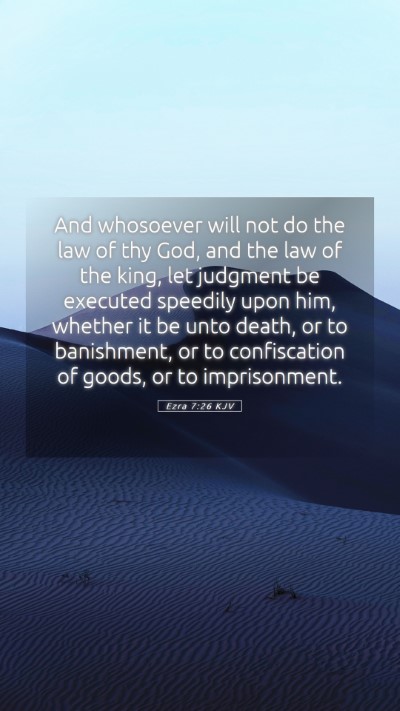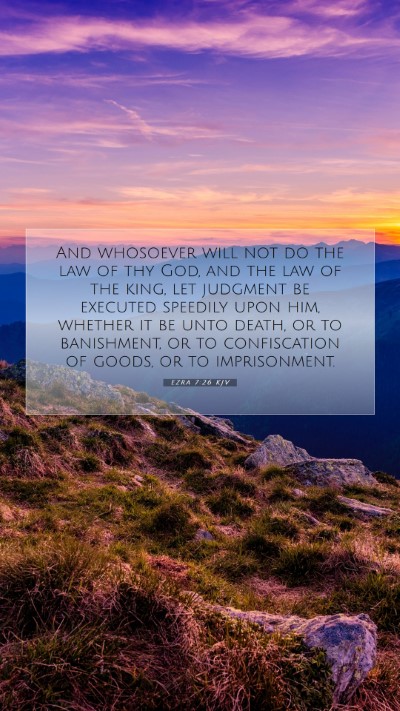Old Testament
Genesis Exodus Leviticus Numbers Deuteronomy Joshua Judges Ruth 1 Samuel 2 Samuel 1 Kings 2 Kings 1 Chronicles 2 Chronicles Ezra Nehemiah Esther Job Psalms Proverbs Ecclesiastes Song of Solomon Isaiah Jeremiah Lamentations Ezekiel Daniel Hosea Joel Amos Obadiah Jonah Micah Nahum Habakkuk Zephaniah Haggai Zechariah MalachiEzra 7:26 Meaning
What is the meaning of Ezra 7:26?
And whosoever will not do the law of thy God, and the law of the king, let judgment be executed speedily upon him, whether it be unto death, or to banishment, or to confiscation of goods, or to imprisonment.
Ezra 7:26 Bible Verse Meaning
Understanding Ezra 7:26 - Bible Verse Commentary
Ezra 7:26 states: "And whosoever will not do the law of thy God, and the law of the king, let judgment be executed speedily upon him, whether it unto death, or to banishment, or to confiscation of goods, or to imprisonment." In this verse, Ezra emphasizes the importance of adherence to both divine and royal laws as a fundamental aspect of governance and spiritual practice.
Contextual Background
This verse arises in the context of Ezra's journey to Jerusalem, commissioned by King Artaxerxes to lead a group of exiles back to their homeland. Ezra is entrusted not only with rebuilding the temple but also with teaching the law of God. This highlights his dual role as both a religious leader and a civic authority. Understanding this historical backdrop helps provide a deeper insight into the motivations behind Ezra's declarations.
Key Insights from Commentaries
-
Matthew Henry:
Henry notes that Ezra's authority was rooted in both God’s law and the king’s edict. He saw himself as a moral and legal standard-bearer, stressing that disobedience to either authority warranted severe consequences.
-
Albert Barnes:
Barnes elaborates on the communal responsibility of the Israelites, underscoring that a well-ordered society rests on obedience to both God and the government. He interprets Ezra’s decree as an attempt to maintain social justice and divine standards.
-
Adam Clarke:
Clarke highlights the legal implications, suggesting this was not merely about spiritual fidelity but about maintaining order in the society. He points out that Ezra’s instruction anticipates the need for discipline within the community to uphold the law.
Meaning of the Verse
The directive in Ezra 7:26 can be understood as a convergence of civic duty and spiritual obedience. Ezra establishes a framework that governs personal conduct within the community, reinforcing the idea that laws, both divine and secular, are instrumental in fostering a just society.
Applications of Ezra 7:26
In applying this verse, we recognize the implications of obedience in our lives today—drawing parallels between ancient Israel and modern society. Here are some insights:
- Civic Responsibility: Just as the Israelites were expected to follow the laws of the land alongside spiritual mandates, today's believers are called to be responsible citizens, respecting civil authority and God's commandments.
- Importance of Justice: The consequences outlined by Ezra stress that justice is essential for societal harmony. It serves as a reminder to uphold truth and righteousness within our communities.
- Spiritual Leadership: Ezra’s dual role as a secular and spiritual leader demonstrates the need for integrity and responsibility in those who lead others in faith as well as in civic matters.
Cross References
- Deuteronomy 17:12: The necessity for obedience to the authorities appointed by God.
- Romans 13:1-5: The New Testament's teaching on the relationship between believers and governing authorities.
- Proverbs 21:15: The joy that comes from the execution of righteousness and the consequences of wickedness.
Conclusion
Ezra 7:26 encapsulates the critical intersection of divine law and secular authority, providing vital Bible study insights for believers. Through understanding this scripture, we gain insight into the significance of obedience, the nature of justice, and the essence of spiritual leadership in both historical and contemporary contexts.
Further Study Topics
For those interested in diving deeper into this subject, consider exploring:
- How to interpret Bible verses in their historical context.
- Significance of Old Testament leadership models.
- Applying Bible verses to daily life and modern governance.


